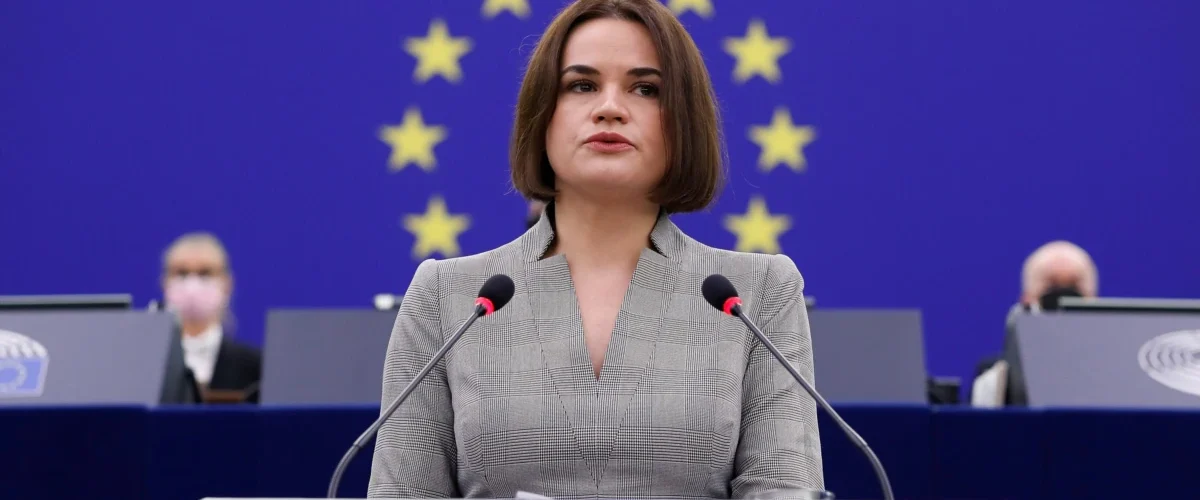Exiled Belarusian opposition leader Svyatlana Tsikhanouskaya has called on the European Union to do more to help Belarusians, whom she called “forgotten Europeans,” in their fight for freedom.
Speaking at the European Parliament on November 24, Tsikhanouskaya talked about the arrest and incarceration of opposition politicians and activists in Belarus.
She also emphasized that the ongoing migrant crisis along her country’s border with three European Union members — Poland, Latvia, and Lithuania– shows that the struggle for freedom in Belarus is linked with the fight for freedom in Europe in general.
Crisis In Belarus
Read our ongoing coverage as Belarusian strongman Alyaksandr Lukashenka ramps up pressure on NGOs and independent media as part of a brutal crackdown against protesters and the opposition following an August 2020 election widely considered fraudulent.
Tsikhanouskaya was the main opposition candidate in the disputed August 2020 presidential election, which handed longtime authoritarian leader Alyaksandr Lukashenka a sixth term as president.
The opposition and the West have refused to recognize the results and have called for a new, independently monitored vote.
Following the election, mass protests broke out against the alleged fraud; the demonstrations were met by a brutal crackdown by the Lukashenka regime. Fearing for the safety of her family, Tsikhanouskaya left Belarus and currently lives in Lithuania.
Tsikhanouskaya stressed that the number of political prisoners in her country is currently 882 — as she put it, “more than the members of this chamber assembled here today.”
Talking about the migrant crisis at the border between Belarus and the three EU member states, Tsikhanouskaya said the thousands of migrants from the Middle East and other countries have become Lukashenka’s “hostages,” thus joining the 9 million Belarusians who she said are hostages of the regime.
Tsikhanouskaya said that if the EU chooses to “avoid confrontation with a bully, it will only make the inevitable showdown much more costly and dangerous.”
She cautioned the West about the continued threat that the Lukashenka regime would pose to the rest of Europe, even if the migrant crisis is somehow resolved.
“But do you really suppose it will stop there? We are already seeing how dangerous a regime like this can be to its neighbors. Lithuania and Poland are facing the biggest test of their border security…. Supposing this abuse of migrants is somehow stopped. Do you really believe the regime’s threats beyond its borders will end there? Increases in the flow of smuggled drugs and other contraband? A military provocation?… None of this is just my imagination. These are threats that the regime itself has made. Whatever it takes to get what it wants,” Tsikhanouskaya warned.
Tsikhanouskaya challenged the 27-member bloc “to have the courage to take decisive action now” and come to the aid of her fellow Belarusians.
“What can the European Union really say to the people of Belarus — to the forgotten Europeans — who want the same things the rest of Europe enjoys? Perhaps we have no right to demand your help or support. Perhaps you may refuse us because it may contradict your national interest. Or perhaps it’s bad for your businesses,” Tsikhanouskaya said.
Tsikhanouskaya also called on the EU to slap more sanctions on Lukashenka’s regime and continue to refuse to recognize the authoritarian, who has run the country since 1994 as the president of Belarus.
She criticized Western media outlets such as Deutsche Welle and the BBC for still referring to Lukashenka as “president.”
“Today, not only democracy in Belarus but also democracy in Europe depends on whether we will walk this path together and overcome these obstacles together. It is time to show that European values are and will continue to be our greatest source of strength — the only solid foundation for peace and prosperity. I am here today to invite you to walk that path with us,” Tsikhanouskaya said.



















